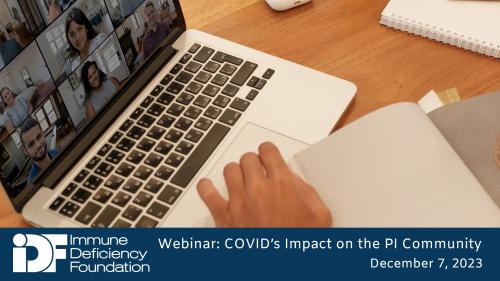
-
Understanding primary immunodeficiency (PI)

Understanding PI
The more you understand about primary immunodeficiency (PI), the better you can live with the disease or support others in your life with PI. Learn more about PI, including the various diagnoses and treatment options.
-
Living with PI
-
Addressing mental health
-
Explaining your diagnosis
- General care
- Get support
- For parents and guardians
-
Managing workplace issues
- Navigating insurance
-
Traveling safely

Living with PI
Living with primary immunodeficiency (PI) can be challenging, but you’re not alone—many people with PI lead full and active lives. With the right support and resources, you can, too.
-
Addressing mental health
-
Get involved

Get involved
Be a hero for those with PI. Change lives by promoting primary immunodeficiency (PI) awareness and taking action in your community through advocacy, donating, volunteering, or fundraising.
-
Advancing research and clinical care
-
Grants
-
IDF surveys
-
Participating in clinical trials
-
Diagnosing PI
-
Consulting immunologist
-
Clinician education

Advancing research and clinical care
Whether you’re a clinician, researcher, or an individual with primary immunodeficiency (PI), IDF has resources to help you advance the field. Get details on surveys, grants, and clinical trials.
-
Grants
While people living with primary immunodeficiency (PI) don’t have the luxury of lowering their vigilance even though COVID-19 is no longer considered a public health emergency, they at least have a greater understanding of how to live as safely as possible thanks to progress made with virus prevention and treatment over the last three years.
Dr. John Sleasman, Duke University School of Medicine’s Chief of Allergy and Immunology and a Distinguished Professor of Pediatrics, shared an update on COVID-19 and PI during an IDF webinar and said that what he told his patients in February 2020 about the SARS-CoV-2 virus and infection with COVID-19 is not the same as what he’d tell them in December 2023. As he and other researchers learn more about the virus, recommendations change.
“Our toolbox is much better now than it was in 2020,” said Sleasman.
Among the most powerful tools is the vaccine. Adhering to the 2023-2024 Centers for Disease Control COVID vaccine recommendations for those who are severely or moderately immunocompromised, Sleasman said that all vaccinated persons with PI six months or older should receive the updated vaccine which is effective across the different variants of SARS-CoV-2.
Released in the fall of 2023, the updated vaccine induces strong immune responses against the Omicron lineage, including the currently circulating strain BA.2.86, as well as other variants, including XBB.1.5, EG.5.1, and FL.1.5.1. It also boosts COVID-19 waning immunity since the last vaccination or infection.
The vaccine is the best way to protect against severe disease, which can lead to hospitalization and death, particularly for those at greatest risk, including people with PI, said Sleasman.
“The benefit of COVID-19 vaccination continues to outweigh the potential risks. The way I think about it when I talk to my patients is that this virus has become so common in the community it’s almost impossible to protect yourself from becoming infected, one way or another. You just have to accept that risk and you can attenuate that risk through vaccination and that serious reactions to the coronavirus vaccine are rare,” said Sleasman.
Another crucial rule to follow if you have PI and want to minimize the risk of contracting the virus is to use an N-95 mask in public places like the airport, the subway, and meetings with large groups of people, said Sleasman.
When it comes to smaller functions such as holiday dinners with family and friends, vaccines, masking, and testing for COVID-19 all work together in reducing risk. If everyone attending a function masks, is vaccinated and tests negative before they gather, that keeps the person with PI safer. Self-tests are easy, inexpensive, and pretty accurate, said Sleasman.
“We need to protect people who can’t protect themselves and quit worrying about our own pride and our own prejudice,” said Sleasman. “Do they care about (their loved ones) or not? It has nothing to do with politics and really is about protecting our most vulnerable populations.”
Sleasman said that data on PI and COVID-19 is limited, but what remains clear is that the virus affects each person with PI differently and that those with PI are at greater risk from severe disease than the general population.
“The bottom line for us as people living with immune deficiency disease is that vaccines are effective across the board and that it will help you prevent disease,” reiterated Sleasman. “What I tell my patients is that COVID-19 is still out there, but the current strains are not as virulent as the initial strains, particularly if you’ve been vaccinated.”
In addition to the vaccine and masking, all persons with PI should meet with their immunologist to assess their risk level based on their type of PI and co-existing health conditions and formulate a plan of treatment about what to do if they test positive for the virus.
“I tell my patients to let’s determine what your factors are so that we’re not having to make this decision at the last minute as to whether or not we need to start Paxlovid (an anti-retroviral) or not,” said Sleasman.
Sleasman said whether a person with PI who is young and otherwise healthy can go out into the world and not be greatly concerned about COVID-19 cannot be answered definitively. For example, he has one patient with common variable immune deficiency (CVID) who regularly travels internationally and has had COVID-19 three times. Still, she remains well enough to continue visiting other countries. Another patient is a police officer with CVID who fell quite ill with COVID-19, even though he was vaccinated, yet he hasn’t stopped working in a public environment.
“People are living normal lives with PI,” said Sleasman. “You just have to assess your risk, and everybody’s individual risk varies.”
Sleasman encouraged members of the PI community to advocate for their inclusion in COVID-19 research. He also invited community members to participate in a study he and a colleague are conducting on COVID-19 vaccine response and PI. The study targets all forms of PI and is currently focused on individuals with X-linked agammaglobulinemia (XLA), a condition in which a person’s antibodies are depleted, but their T cells remain intact. One of the goals of the study is to find out how T-cell immunity wanes and whether it wanes similarly to that of antibodies.
“I think that we still have a great deal to learn about SARS-CoV-2 and COVID-19, and it’s going to be with us for many years. We are going to have to learn to live with it and how to mitigate and minimize our risk,” he said.
Topics
This page contains general medical and/or legal information that cannot be applied safely to any individual case. Medical and/or legal knowledge and practice can change rapidly. Therefore, this page should not be used as a substitute for professional medical and/or legal advice.
Related resources
Sign up for updates from IDF
Receive news and helpful resources to your cell phone or inbox. You can change or cancel your subscription at any time.





The Immune Deficiency Foundation improves the diagnosis, treatment, and quality of life for every person affected by primary immunodeficiency.
We foster a community that is connected, engaged, and empowered through advocacy, education, and research.
Combined Charity Campaign | CFC# 66309



